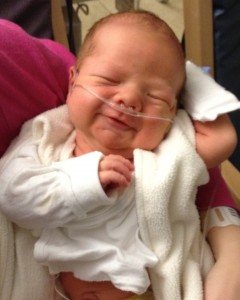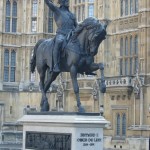I’ve been thinking about breath lately.
Michelle Voss Roberts, in her fascinating book, Dualities: A Theology of Difference, spotlights the female, medieval spiritual writer, Mechthild of Magdeburg. Mechtild was fascinated by fluidity. Water flows. Blood flows. Air flows. God flows. Everything flows. Mechthild wrote, “Lord, between you and me there goes unceasingly an imperceptible breath in which I come to know and see many marvels” (Voss Roberts, 112). Air is a foundational element of human life. Without oxygen, no life. In medieval Christian thought, air was associated with divinity. God’s breath is all around us. It’s within us. It gives us life. It gives us marvels.
Our second child, Luke Daniel, was born just over a month ago. In the first two weeks of his life, he had a rough time breathing due to an acute case of “meconium aspiration.” On his way out of the womb, as he journeyed toward his first gulp of air, he inhaled his feces. Everything flows. This led to severe inflammation of his lungs, hampering his oxygen intake. This is not an uncommon situation for newborns, and we never feared for his life. But it was still hard to watch his little chest surge as he worked a little harder than most–over the course of several weeks — for his breath. His lungs are fine now. Breathing now comes as naturally to him as it does to most of us — as if without thinking.
“meconium aspiration.” On his way out of the womb, as he journeyed toward his first gulp of air, he inhaled his feces. Everything flows. This led to severe inflammation of his lungs, hampering his oxygen intake. This is not an uncommon situation for newborns, and we never feared for his life. But it was still hard to watch his little chest surge as he worked a little harder than most–over the course of several weeks — for his breath. His lungs are fine now. Breathing now comes as naturally to him as it does to most of us — as if without thinking.
Greek metaphysics (Plato, Aristotle) gave us dualism. Modernity entrenched it. The world was carved up according to the seen and the unseen, the body and the spirit. As Voss Roberts suggests, Christian thought is too often dualist, in that sense. Another perspective was expressed by the medieval mystics (which, she suggests, resonates with some articulations of eastern, Hindu thought). This is not a simplistic “everything is one” monism, but a recognition of the complex relationship of dualities, in which body and soul are distinct and yet inter-connected. In the Hebrew Bible, the spirit is associated with wind and breath. God breathed “the breath of life” into the first human’s nostrils.(Gen 2:7). Job’s friend Elihu wrote, “The Spirit of God has made me; the breath of the Almighty gives me life” (Job 33:4). Breath is a powerful, energizing force; it animates, it enlivens. And when it leaves, so does life. Our experience of breath, of life, is integrated with our experience of God.
I am thankful today for breath and I am acutely conscious that our bodies are connected, not only to the air around us, but to the divine breath that gives us life. Life is a beautiful, mysterious and fragile thing. The divine reality is not distant from our fragility, but penetrates and sustains it, for as long as we have breath.
Everything flows.












